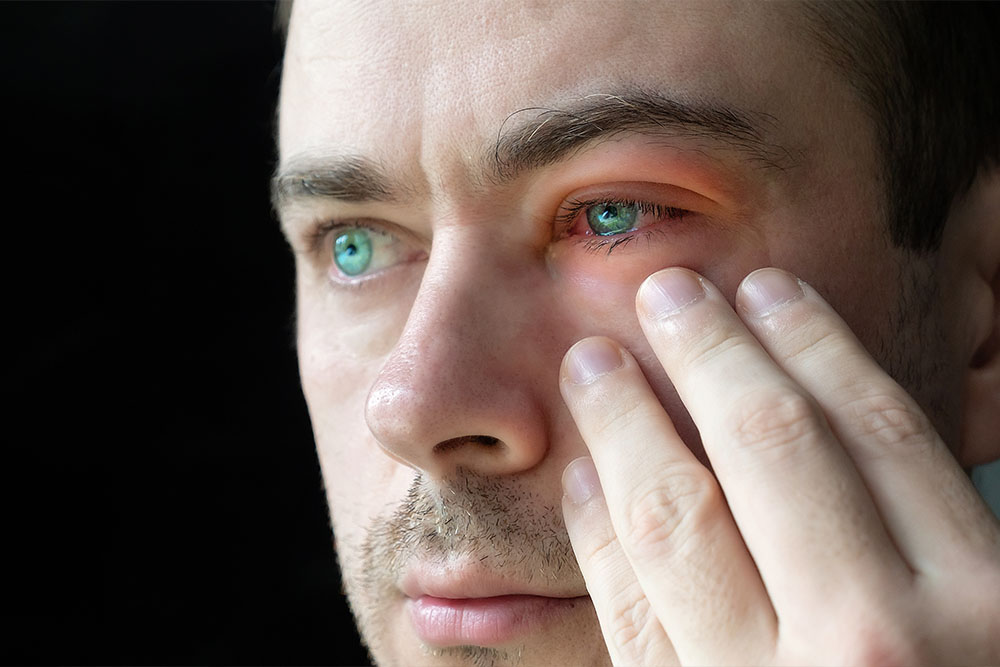Allergies can be a difficult thing to manage, especially when they affect your eyes. Allergic conjunctivitis is an extremely common condition that can cause uncomfortable symptoms such as redness, itchiness, and swelling of the eye. While there is no cure for allergic conjunctivitis, there are ways to manage the condition in the long term. In this blog post, we’ll provide tips on how to effectively manage your allergic conjunctivitis over time so you can keep enjoying life symptom-free!

Understanding Allergic Conjunctivitis
Allergic conjunctivitis is a common ocular allergy, typically caused by an allergic reaction to substances like pollen, dust mites, and pet dander. This condition leads to symptoms like eye redness, itching, and swelling. Understanding the nature of allergic conjunctivitis is the first step in effective long-term management.
The Importance of Long-Term Management
Managing allergic conjunctivitis over the long term is crucial to maintain the health of the conjunctival mucosa and to provide relief from symptoms. Consistent management can prevent the progression of the condition and improve the quality of life.
Recognizing the Causes of Allergic Conjunctivitis
Common Allergens and Environmental Factors
Allergic conjunctivitis is often triggered by airborne allergens such as pollen, animal dander, and dust mites. These allergens cause the release of histamines, leading to ocular surface inflammation. Recognizing these common allergens is key to managing allergic symptoms.
How Your Lifestyle Affects Allergic Conjunctivitis
Lifestyle factors, including exposure to allergens in your home or workplace, can exacerbate allergic conjunctivitis. For instance, using a vacuum cleaner with a HEPA filter can reduce dust-mite allergy, and wearing wraparound sunglasses can protect your eyes from pollen.
Essential Tips for Allergic Conjunctivitis Management
Identifying and Avoiding Triggers
- Allergy Forecast: Regularly check the pollen count and allergy forecasts, especially during spring and summer months. Plan your outdoor activities on days when the pollen count is lower to reduce exposure.
- Home Environment: Make your home a safe haven from allergens. Use dust-proof mattress covers, regularly wash bedding in hot water to kill dust mites, and consider removing carpets if you have a dust-mite allergy. If pet dander is a problem, designate pet-free zones, particularly in bedrooms.
- Work Environment: If possible, adjust your workspace to reduce allergen exposure. This might include using an air purifier and keeping windows closed during high pollen days.
Importance of Personal Hygiene
- Hand Washing: Frequently wash your hands, especially after coming indoors, to remove any allergens. This is one of the most effective ways to prevent allergens from coming into contact with your eyes.
- Avoid Touching Eyes: Touching or rubbing your eyes can worsen symptoms by physically irritating the eyes and introducing allergens. Keeping your hands away from your eyes is a simple yet effective way to manage allergic conjunctivitis.

Role of Nutrition in Managing Allergic Eye Conditions
- Anti-Inflammatory Diet: Incorporate foods that are known to combat inflammation. Omega-3 fatty acids found in fish, flaxseed, and walnuts are beneficial. Fruits and vegetables high in antioxidants can also help.
- Hydration: Staying well-hydrated is essential. Adequate fluid intake helps maintain the natural moisture balance in the eyes, which can benefit those with dry eyes related to allergic conjunctivitis.
- Supplements: Certain supplements like quercetin, a natural antihistamine, and stinging nettle may provide relief from allergic symptoms. However, it’s important to consult with a healthcare professional before starting any supplements.
Medical Treatments and Allergic Eye Condition Management
Understanding Different Medications
For effective management of allergic conjunctivitis, it’s crucial to understand the various treatment options available. A comprehensive treatment plan may include several types of medication, each targeting different aspects of the allergic response. These may include:
- Antihistamine Eye Drops: These drops are designed to quickly alleviate eye redness and itching by blocking the action of histamines, which are chemicals released during an allergic reaction.
- Systemic Antihistamines: Oral antihistamines can provide relief from widespread allergic symptoms, including those affecting the eyes.
- Topical Corticosteroids: In more severe cases, a topical corticosteroid may be prescribed. These are effective in reducing inflammation but should be used cautiously under medical supervision due to potential side effects.
- Mast Cell Stabilizers: These medications help prevent the release of histamines and other inflammatory mediators from mast cells, thereby reducing allergic symptoms over time.
The Role of Eye Drops in Long-Term Care
Eye drops play a pivotal role in the long-term management of allergic conjunctivitis. Different forms of eye drops are used depending on the severity and type of allergic conjunctivitis:
- Artificial Tears: For mild cases, artificial tears can help in alleviating dryness and flush out allergens from the eye’s surface.
- Antihistamine Eye Drops: These are often the first line of defense against ocular allergies. They provide rapid relief by blocking the effects of histamines.
- Mast Cell Degranulation Inhibitors: Used in conjunction with antihistamines, these can help in managing chronic conditions by preventing mast cell degranulation.
- Combination Drops: Some eye drops combine antihistamines with mast cell stabilizers for more comprehensive treatment.

When to Consult Healthcare Professionals
Look for medical advice if symptoms persist or worsen. An eye care professional can offer effective treatment options and guidance for managing allergic symptoms.
Advanced Tips for Allergic Conjunctivitis Management
Incorporating Holistic Approaches
A holistic approach includes managing stress and ensuring sufficient sleep, as stress can worsen allergic symptoms, and sleep aids in overall health and allergy resistance.
Managing Flare-Ups Effectively
During high allergy seasons or when experiencing acute symptoms, it may be necessary to intensify management strategies. This might include avoiding outdoor activities on high pollen days and using air purifiers to reduce indoor allergens.
Navigating Seasonal Changes
Seasonal allergies, particularly in spring and summer months, can significantly affect allergic conjunctivitis. Staying updated with the allergy forecast and adjusting daily routines can help manage symptoms more effectively.
Creating a Supportive Environment for Allergic Conjunctivitis
Home and Workplace Adjustments
Creating an allergen-free environment, both at home and at work, is critical. This includes using hypoallergenic products and ensuring that the living and working spaces are regularly cleaned to reduce allergens.
Coping with Emotional Impact
Living with a chronic condition like allergic conjunctivitis can be challenging. It is recommended to seek support from friends, family, or mental health professionals to cope with the emotional aspects of the condition.
Long-Term Strategies and Lifestyle Adaptations
Regular Health Check-Ups
Consistent monitoring of your condition is crucial. Regular visits to an eye care professional can help track the progress of your allergic conjunctivitis. These check-ups can also provide an opportunity to adjust your medical treatment as needed, ensuring you receive the most effective and up-to-date care. Regular eye exams can catch any complications early, such as corneal ulcerations, which are rare but can occur with severe allergic conditions.
Balancing Diet and Exercise
Diet and exercise play a significant role in managing allergic conjunctivitis. A well-balanced diet, particularly one rich in omega-3 fatty acids and antioxidants, can help strengthen the immune system, potentially making allergy symptoms less severe. Foods like fatty fish, nuts, seeds, and leafy green vegetables should be staples in your diet. Regular exercise helps enhance overall health, which can contribute to a stronger immune system and better allergy resistance. Activities like walking, swimming, or cycling are excellent options.
Environmental Control
Controlling your environment is key to minimizing exposure to allergens. In the home, using air purifiers, especially during high pollen days, can help reduce airborne allergens. Similarly, employing dust-proof covers on bedding can combat dust-mite allergy. In workplaces, being mindful of air quality and maintaining a clean space can significantly reduce the risk of allergic reactions.
Mental Health and Emotional Well-being
Allergic conjunctivitis, especially when it persists over a long period, can take a toll on your mental health. Stress management techniques, such as mindfulness, yoga, or even seeking professional counseling, can be beneficial. Maintaining a positive mental state can influence your physical health and aid in the management of allergic symptoms.
Staying Informed and Educated
Keeping up-to-date with the latest information and research on allergic conjunctivitis can empower you in your management journey. Understanding the intricacies of the condition, such as the role of inflammatory mediators in allergic reactions or the latest advancements in treatment options, can help you make informed decisions about your care.
Conclusion: Empowering Yourself in Managing Allergic Conjunctivitis
In conclusion, effective long-term management of allergic conjunctivitis involves a combination of understanding the condition, adopting suitable lifestyle changes, and seeking regular medical advice. With the right approach, individuals can achieve significant relief from symptoms and improve their quality of life.
If you are suffering from allergic conjunctivitis and want to learn more about long-term management strategies, contact Becker ENT & Allergy for expert advice. They can provide you with the latest information and research to empower you in managing your condition.

